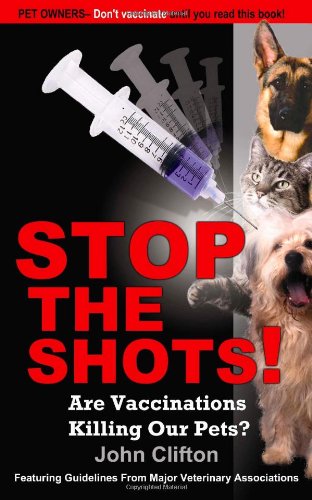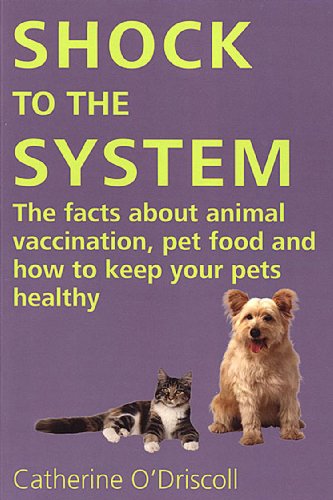
The vaccine controversy. Everyone with access to the internet has heard about the dangers of over-vaccination, the horrible side effects from vaccines, and so on. And yet the vet keeps sending you those reminder cards about getting vaccines. The law requires dogs to be vaccinated against rabies every three years. And your own dog doesn't seem to suffer any side effects from his shots. Are you risking his life every time he gets vaccinated? What are the real facts here?
We are not sure what started the whole distrust of vaccines in first place, but it seems to have really escalated after the autism mess. Back in the 1990s some researchers faked data showing autism was caused by vaccines. The media picked it up and reported it gleefully and parents panicked. The fraud was eventually discovered, but an astonishing number of people still believe vaccines cause autism and refuse to vaccinate their children. This has led to a lot of harm as diseases that were once firmly under control started spreading and sickening people again.
The other possible cause of the vaccine distrust may be the cat-sarcoma story. It is true that some cats develop cancer at vaccine injection sites. These cancers are, however, extremely rare, affecting an estimated one out of every 10,000 to 30,000 injections. They are also not actually linked to the vaccine, seeming to be more of a reaction to the adjuvant included in many vaccines. In any case, that is in cats, not dogs, and we are discussing dogs here.
So we looked vigorously through published scientific studies to see if we could actually find some facts on vaccine safety in dogs. We found two very large studies of adverse events after vaccination. Severe reactions to vaccines are generally reported to affect 0.4 to 0.6% of dogs (Miyaji et al. 2012; Moore et al. 2005). Yes, well under 1% of vaccination events have serious adverse events. These adverse events can generally be described as "hypersensitive" strong immune reactions to the injection- an allergic reaction to the shot.
Many vaccines are preserved with thiomersal, which contains mercury. The media and parents have made a lot of fuss about giving children vaccines containing mercury. We found a study published in Neurological Endocrinology Letters that found no increase in measurable mercury levels in dogs after vaccination. There was a link between how much fish the dog ate and the amount of mercury in its body (Sedlackova et al. 2013).
And that's it. No widespread reports of dogs dropping dead from vaccines or getting sick from vaccines. Vaccines seem remarkably safe, overall, if you look at the facts instead of the flap.
We scanned various websites trying to identify the diseases and conditions that vaccines are supposed to cause. Vaccinosis pops up frequently- but it's a made-up condition that doesn't actually exist. Vaccines don't damage the immune system (actually, they strengthen it). There's a remote possibility that vaccines can, in very rare cases, trigger autoimmune diseases. This possibility is unproven and doesn't really seem to affect very many dogs, if any.
It is perfectly normal for your dog to have a mild reaction to a vaccine. Feeling a bit lethargic, sore and achy for a few days after getting a vaccine is to be expected. It means the immune system is responding well to the shot.
 Stop the Shots!: Are Vaccinations Killing Our Pets?
Stop the Shots!: Are Vaccinations Killing Our Pets?Much of the fuss about dog vaccines is about how frequently they are given. After human children finish their series of vaccines they don't get booster shots every year. A few human vaccines need to be boostered, but certainly not yearly. For example, tetanus is supposed to be boostered every ten years, and it seems that whooping cough needs to be boostered approximately every ten years as well.
So why do dogs have to get boostered so often? The answer is that no one has studied how long the dog vaccines provide protection. The manufacturers of the vaccines have no incentives to perform such studies- they make a lot of money from frequent boostering schedules.
There is a study on-going right now to test the duration of protection provided by the rabies vaccine. The study is hoping to extend the interval between rabies shots from the current three years to seven years or even longer. Preliminary results don't look very promising- after five years the titer of anti-rabies antibodies in the dogs has dropped to the point that one would not expect them to be protected against rabies. It's kind of a horrible study- the dogs will now be deliberately infected with rabies and then killed to see if it infected them.
Interestingly enough, the rabies duration study is being funded by donations from pet owners, not by any vaccine manufacturer. The rabies vaccine is believed to trigger more adverse reactions than any of the other vaccines commonly given to dogs. And since it's legally required, pet owners whose dogs reacted badly to it once have to keep giving it to their dogs, which is bad medicine. With the other vaccines, if a dog does have a bad reaction, most vets will suggest not re-vaccinating again with that particular vaccine.
Most people do feel that it's kind of ridiculous to booster dogs every single year, which is why the vets have generally gone with a once-every-three years schedule lately. This is not based on any real science, just a gut feeling and also convenience- the rabies vaccine has to be given every three years, so why not just shift all of the vaccines to an every three years schedule?
 Secrets of a Vet Tech: The Guide to Low Cost Pet Care when the Cupboard is Bare
Secrets of a Vet Tech: The Guide to Low Cost Pet Care when the Cupboard is BareMany people who complain about the dangers of vaccines frequently seem to forget that the dangers of not-vaccinating are very real. The three big diseases in dogs are distemper, parvo and rabies. In the United States, due to vaccination, these diseases rarely kill dogs anymore. Most pet owners and many vets have never seen or even heard of a dog coming down with these diseases. Because of vaccines.
Distemper is a particularly nasty disease. There is no treatment for it- none. Dogs who survive the initial illness frequently go on to develop severe neurological problems. Distemper kills 50% of adult dogs and 80% of puppies who contract it. It is highly contagious. It used to be widely feared by dog owners.
Parvovirus is a relatively recent disease that didn't exist prior to the vaccine era. It is a particularly scary virus because it lingers in the environment for months, just waiting for an unvaccinated dog to come along and pick it up. And there is no treatment for parvovirus, either. Many dogs die after contracting parvovirus. Puppies can be infected in utero if the mother hasn't been vaccinated properly against parvovirus.
Rabies is the ultimate scary dog disease. It's incurable, 100% fatal and can be passed to people. Rabies in dogs is still a big problem in some parts of the world where vaccination is unknown.
All puppies should receive the full course of shots against these three killers. It is the height of irresponsibility to not protect the dog against these killers no matter what beliefs you hold about the dangers of over-vaccination. If you decide to skip the booster shots after the final one-year booster, ok, that's your choice but it's not based on facts. It might be safe to skip the booster shots and it might not be. Vaccines don't appear to be anywhere near as dangerous as you'd think from the many rumors and hysteria flying around.
 Shock To The System
Shock To The System Is it a Dog or a Bear?
For large dog breed lovers t
Is it a Dog or a Bear?
For large dog breed lovers t
 Heartburn in Dogs
If your dog is anything like
Heartburn in Dogs
If your dog is anything like
 The Evolution of Dogs: 5 critical steps in the evolution of the modern dog
5 Critical Steps in the Evolution of Dogs
The history of o
The Evolution of Dogs: 5 critical steps in the evolution of the modern dog
5 Critical Steps in the Evolution of Dogs
The history of o
 The Best Products For Little Dogs
The Best Products For Little Dogs
Small dogs aren抰 access
The Best Products For Little Dogs
The Best Products For Little Dogs
Small dogs aren抰 access
 Inexpensive Leather Dog Collars
Cheap Leather Collars for Do
Inexpensive Leather Dog Collars
Cheap Leather Collars for Do
Copyright © 2005-2016 Pet Information All Rights Reserved
Contact us: www162date@outlook.com